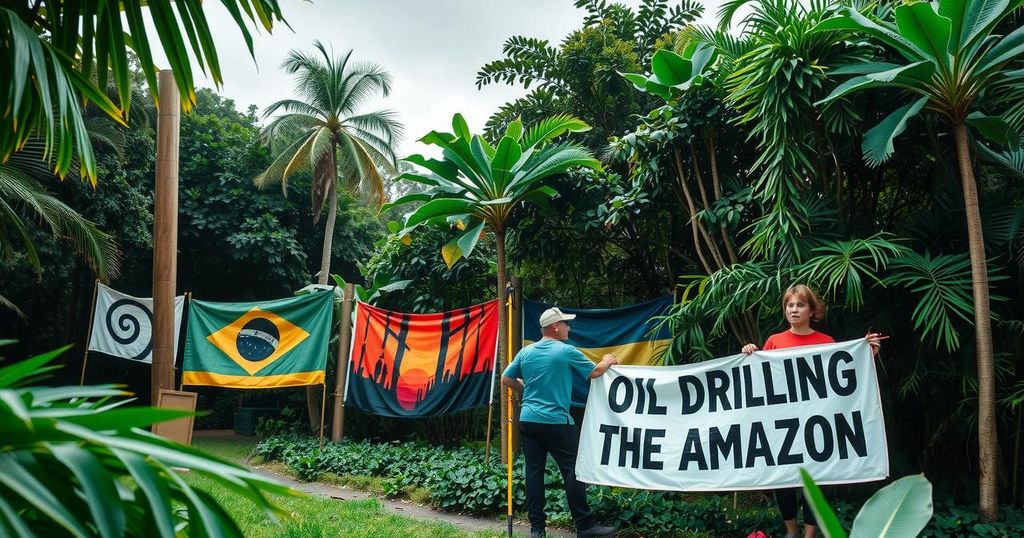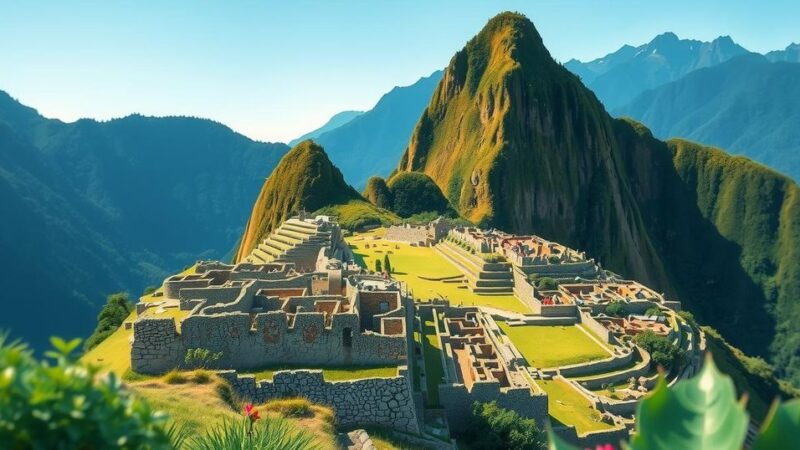Brazil auctioned oil sites near the Amazon despite protests. Environmentalists and Indigenous groups raised concerns over drilling impacts on ecosystems. The National Oil Agency aims for diversification amidst scrutiny from critics regarding climate commitments.
On Tuesday, Brazil auctioned off several oil blocks near the Amazon, with plans to ramp up production in untouched areas, despite strong backlash from environmentalists and Indigenous groups. The auction took place at a luxury hotel in Rio de Janeiro, just months ahead of Brazil hosting the U.N.’s climate talks in the Amazon. Protesters voiced concerns about the dangers that drilling poses to the Amazon’s fragile ecosystems and the local Indigenous communities.
The auction featured 172 oil blocks, including 47 offshore near the Amazon River mouth. Most of these areas are currently unproduced, with some blocks situated close to Indigenous territories. The high-profile event saw sales including 19 blocks to industry giants like Chevron, ExxonMobil, Petrobras, and CNPC, all eager to tap into what they see as a promising region similar to the geology of Guyana, which has yielded significant offshore discoveries recently.
Environmental risks in this area are concerning, particularly due to its turbulent currents and proximity to sensitive coastal regions. In a controversial move, President Luiz Inácio Lula da Silva put pressure on the Brazilian Institute of the Environment and Renewable Natural Resources (IBAMA) to allow Petrobras, the state oil company, to start exploratory drilling near the river mouth even before final environmental licenses were granted.
Nicole Oliveira, the executive director of the nonprofit Arayara, expressed her dismay, stating “it’s regrettable and concerning that blocks are being acquired in a basin that has not yet received environmental licensing.” Oliveira’s group attempted to halt the auction legally but was unsuccessful. She noted that they will continue to fight to prevent exploration in these blocks, deeming the auction a reckless decision.
The auction, which concluded with only 34 awarded blocks, raised a record-breaking $180 million in signing bonuses. An agency spokesperson noted that one of the awarded blocks saw a staggering markup of almost 3,000%, signaling strong interest from companies.
A peaceful protest with around 200 participants, including environmentalists and Indigenous leaders, took place outside the auction site. Giovane Tapura, a representative of the Manoki tribe, voiced their discontent, stating, “We would have liked to be consulted and to see studies on how the oil drilling could affect us. None of this has been done.”
In a statement, Brazil’s National Oil Agency framed the auctions as essential to the country’s strategy for energy diversification, promoting a transition to a low-carbon economy. They insisted that contracts would require measures to lessen carbon intensity and fund energy transition initiatives.
Brazil increased its crude oil production last year, eclipsing soybean exports to become the country’s leading export product. The government’s strategy aims to bolster and continue oil output into the 2030s, even as current block production is anticipated to drop. Brazil’s energy largely hinges on hydropower and other renewables, contrasting with the push for more fossil fuel production.
As Brazil prepares for the upcoming U.N. climate talks in Belem, critics argue that President Lula’s fossil fuel expansion plans contradict his environmental assurances. Claudio Angelo, from Climate Observatory, commented that the government’s decision poses a risk to the future, highlighting the urgent call to halt fossil fuel expansion based on scientific consensus.
In summary, while Brazil seeks to enhance its fossil fuel output, many voices caution that such steps jeopardize not only local ecosystems but also the country’s commitment to global climate goals.
In conclusion, Brazil’s recent auction of Amazon oil blocks has ignited intense debate and protests from environmentalists and Indigenous groups. Despite the government’s push for energy diversification and expanded oil production, critics highlight the risks posed to vulnerable ecosystems and communities. As Brazil heads towards hosting U.N. climate discussions, these contradictions might undermine its environmental reputation on the global stage. Moving forward, the balance between economic interests and climate commitments remains critically under scrutiny.
Original Source: www.kob.com






